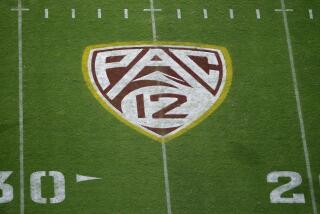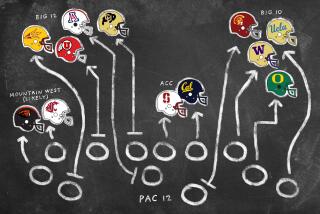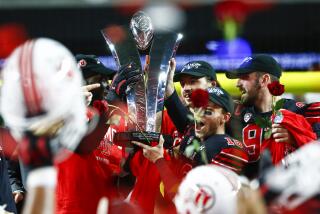Pac-12 voluntary workouts set to begin as soon as June 15
- Share via
The Pac-12 Conference has taken its first step toward football season, as league executives voted Tuesday to allow voluntary, on-campus workouts for all athletes beginning as soon as June 15.
Decisions on when those workouts begin on respective campuses will be left to the Pac-12’s member schools. As the rest of college football begins trending toward normalcy, the conference many expected to act most conservatively in returning to football in the wake of the COVID-19 pandemic appears to be falling in line with the remainder of the Power Five conferences.
The vote to allow voluntary, on-campus workouts follows the NCAA’s decision last week to officially permit conferences and schools to reopen June 1. The Pac-12 had previously suspended team activities across the board through May 31.
University of Colorado chancellor Philip DiStefano, who serves as the group chair of Pac-12 chief executives, said in a statement that any considerations to allow athletes to return to campus were “foremost guided by the advice of our own medical experts along with public health officials.”
Pac-12 Commissioner Larry Scott explained last week in an interview with CNN that a June return would put the conference on schedule to return for fall football camp as early as late July. On Tuesday, Scott reiterated his point that a return to campus would be safer for student-athletes.
“As states have either already opened or begin to open up access to parks, gyms and other training facilities, student-athletes should have the option at this time to be in, what for many, will be a much safer environment on campus, where they can have access to the best available health, well-being and training support,” Scott said.
State responses within the conference vary wildly, as California, Oregon and Washington have opened much more cautiously than Arizona, where fitness centers have already begun to reopen. Those stark differences could mean that several programs, including UCLA and USC, might not allow student-athletes on campus until a much later date.
In a statement, USC athletic director Mike Bohn said that the conference’s decision would “pave the way for USC Athletics to begin a phased return to campus for in-person, voluntary workouts in the weeks ahead,” but didn’t specify when that return might take place.
“With reopening processes beginning in states all around the country, today’s vote is another positive indicator of our progress toward the start of our football and other fall sports seasons,” Bohn said. “As this is a rapidly evolving situation, it is imperative that we move forward responsibly and with the utmost care for the health and safety of everyone connected to our program.”
Other conferences have taken different approaches to welcoming back their athletes. The Southeastern Conference announced last week that voluntary workouts would be allowed on campus June 8, while the Big 12 won’t allow a return until June 15. The Big Ten and ACC have left the decision to their member schools.
Whenever they are allowed to return, the Pac-12 has provided several guidelines and protocols, including best practice recommendations for testing, contact tracing, hygiene and social distancing. Included in those guidelines are “daily symptoms and temperature tests,” suggestions for “increased cleaning,” small-group workouts, appointment-based training sessions, “to-go meals” at dining facilities and a requirement of “face coverings at all times.”
On-field coaching remains prohibited, but the return of coaches to campus appears imminent in early July. Coaches and administrators across the country have suggested that at least six weeks are necessary for football programs to sufficiently ramp up for a season, with a four-week fall camp expected in August.
International student-athletes at UCLA and USC have found that a global pandemic can bring about long waits to get home and days spent in isolation.
Last week, Bohn said that the school was still working on safety protocols, including how often players and staff members would need to be tested.
“We want to monitor groups of student-athletes — where they eat, where they work out, where they lift weights, where they live, dorm rooms, number of student-athletes per restroom, all those different pieces of the protocols,” Bohn said in a Zoom interview with West Coast Sports Associates. “It’s extensive.”
Tuesday’s announcement is just the beginning in that regard, as officials across the sport grow increasingly optimistic that college football season could start on time.
More to Read
Go beyond the scoreboard
Get the latest on L.A.'s teams in the daily Sports Report newsletter.
You may occasionally receive promotional content from the Los Angeles Times.











